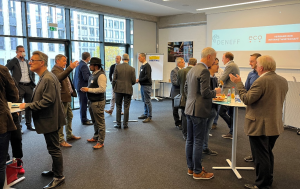Digital infrastructures are the basis for more CO2 savings and more sustainability – thanks to digitalisation. However, to fully exploit these potentials, more interdisciplinary cooperation is needed. This is the major finding of the roundtable “Energy Efficiency in Data Centres” which took place on 17 November and was organised by eco – Association of the Internet Industry and DENEFF (German Corporate Initiative on Energy Efficiency).
Waste heat from data centres is valuable and can be sensibly recycled if all stakeholders cooperate. This was once again proven by the roundtable “Energy Efficiency in Data Centres”, in which representatives of federal politics, as well as experts from all over Germany, participated virtually and on-site in Frankfurt. The eco Association and DENEFF have invited participants to the meeting centre of DE-CIX – the largest Internet Exchange.
After a brief welcome, the moderators Markus Schaffrin (eco) and Martin Bornholdt (DENEFF) gave the floor to Mr Thomas Hirsch from the German Federal Ministry for Economic Affairs and Climate Action (BMWK). In his keynote speech, Hirsch spoke about fundamental questions of energy efficiency as well as approaches to the planned German Energy Efficiency Act, which addresses data centres in Germany in a dedicated chapter. In the ensuing discussion, it became clear that the proposed requirements from the announced draft act regarding the release of waste heat from data centres cannot realistically be implemented in their current form, given that, above all, the market to purchase the amount of waste heat sketched in the draft simply does not exist in Germany. In the view of the data centre operators, due to the absence of customers, a unilateral obligation to release waste heat would therefore misfire the intended goal of this part of the German Energy Efficiency Act.
In his presentation, Attorney-at-law Dr Dirk Leger then discussed the legal framework and legal hurdles in the highly regulated German energy market.
Data centres already take responsibility for heat utilisation
Instead of pure theory and legislative initiatives, the focus was placed on practice:
The agenda included the presentation of numerous and diverse examples that already exist for the efficient utilisation of waste heat from data centres. This is because, as a climate-friendly energy source, waste heat is an exciting option for decarbonising heating networks, for heating buildings or even for some industrial processes.
Waste heat utilisation in agriculture – best practices:
- Fish farming: Karl Rabe, Founder and Managing Director of WoodenDataCenter
- Asparagus crops: Rupert Reisch, Agricultural Engineer, Asparagus + Berries Baumann
- Insect breeding: Matthias Vesterlund, Project Manager and Senior Researcher for Digital Systems and Informatics at the ICE Data Centre.
Waste heat also offers various possible applications for industrial processes, according to the following companies:
- Dried fruit production and biomass drying: Matthias Vesterlund, Project Manager and Senior Researcher for Digital Systems and Informatics at the ICE Data Centre
- Sustainable washing and preservation: Benjamin Ott, Research Associate Efficient Energy Use, Institute of Energy Economics and Rational Energy Use (IER)
For the building sector, waste heat utilisation could contribute to the necessary climate neutrality of the entire sector. Best practices are:
- Internal waste heat recovery and hot water preparation: Werner Stark, Freelance Consultant and former Project Manager at IBM Deutschland GmbH
- Feeding into local heating network: Günter Eggers, Head of Public Relations at NTT Global Data Centers EMEA
- Feeding into district heating network: Staffan Reveman, Managing Director of Reveman Energy Academy and Reveman Energy Consulting
- Feasibility study on waste heat utilisation in Eschborn and Frankfurt Sossenheim: Dr Janybek Orozaliev, Research Associate for Solar and Plant Engineering at the University of Kassel
Other examples include road frost protection and sports field heating, as presented by Innovative WärmeNetze GmbH. Alternative electricity generation options can also be implemented through the utilisation of waste heat. The research on this is being conducted at the Institute of Energy Economics and Rational Energy Use. If waste heat cannot be utilised directly, there are ways to store it, as the Weidemann planning office showed in its case study. The company greenDCision GmbH also deals with heat storage systems for the utilisation of waste heat from data centres.
Mira Weber (DENEFF) and Markus Schaffrin (eco) summed up the day:
As the numerous practical examples impressively demonstrated, the utilisation of waste heat in data centres has long been a reality – especially where partners are there together to exchange ideas. Digital infrastructures, such as data centres, are therefore already making an important contribution to the responsible use of energy – and to Germany achieving its climate targets. Promoting this cooperation, thinking and acting in holistic systems will also increase the importance of data centres and their waste heat utilisation in the future.
After the end of the event, many of the participants took the opportunity to enjoy networking over finger food and drinks.
Contacts to the persons in charge of the best practice users will be provided by Mira Weber, Project Manager of Bytes2Heat and co-organiser of the roundtable on “Energy Efficiency in Data Centres”.




